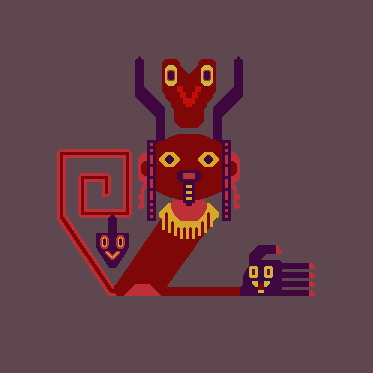No edit summary |
>TenhGrey (Rewrote article and added .gif image) |
||
| Line 1: | Line 1: | ||
[[File: | [[File:Aztec_Rave_Monkey.gif|right|frame|The Aztec Rave Monkey animation]] | ||
The Aztec Rave Monkey is | The Aztec Rave Monkey is a full-screen event that occurs when Madotsuki looks into a conspicuous hollow totem sculpture in a certain area of the [[Wilderness]]. | ||
The screen fades to black and the animation is played along with a lively instrumental beat. Unsuspecting players are likely to be taken aback by the sudden explosion of vibrant color that stands in stark contrast to the bland hues of the Wilderness area. | |||
[http://www.youtube.com/watch?v=h5_K4axvtdk "Youtube video of the Aztec rave Monkey"] | |||
Individual slides of the Aztec Rave Monkey animation can also be seen in the scrolling parallax backgrounds of other worlds, such as the [[Forest World]] and [[Block World]]. | |||
== Interpretation == | |||
There are numerous instances of Aztec imagery blended with postmodern art styles throughout the game, including the Kalimba TV channel, [[The Nexus]] floor pattern, the paintings in the [[Mural World]] and various parallax backgrounds (such as in the [[Forest World|Forest]] and [[Eyeball World|Eyeball Worlds]]) of which the Aztec Rave Monkey is probably the most popular. | |||
This recurring theme in Madotsuki's dreams may be a result of the Aztec-style carpet pattern in her room - one of the few sources of visual stimulation in her waking world. | |||
It is likely that Kikiyama selected this theme as it is a relatively 'alien' art style in most cultures and is therefore an effective way to demonstrate the bizarre nature of dreams to the player, and is also a flexible visual tool that can be seen as either intimidating or humorous depending on the nature of the image and the context of the environment. | |||
Revision as of 00:03, 3 March 2011
The Aztec Rave Monkey is a full-screen event that occurs when Madotsuki looks into a conspicuous hollow totem sculpture in a certain area of the Wilderness.
The screen fades to black and the animation is played along with a lively instrumental beat. Unsuspecting players are likely to be taken aback by the sudden explosion of vibrant color that stands in stark contrast to the bland hues of the Wilderness area.
"Youtube video of the Aztec rave Monkey"
Individual slides of the Aztec Rave Monkey animation can also be seen in the scrolling parallax backgrounds of other worlds, such as the Forest World and Block World.
Interpretation
There are numerous instances of Aztec imagery blended with postmodern art styles throughout the game, including the Kalimba TV channel, The Nexus floor pattern, the paintings in the Mural World and various parallax backgrounds (such as in the Forest and Eyeball Worlds) of which the Aztec Rave Monkey is probably the most popular.
This recurring theme in Madotsuki's dreams may be a result of the Aztec-style carpet pattern in her room - one of the few sources of visual stimulation in her waking world.
It is likely that Kikiyama selected this theme as it is a relatively 'alien' art style in most cultures and is therefore an effective way to demonstrate the bizarre nature of dreams to the player, and is also a flexible visual tool that can be seen as either intimidating or humorous depending on the nature of the image and the context of the environment.

